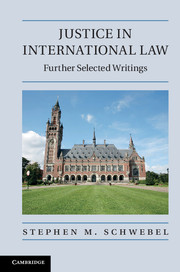Book contents
- Frontmatter
- Contents
- PART I International Court of Justice
- PART II International arbitration
- 12 A BIT about ICSID
- 13 The influence of bilateral investment treaties on customary international law
- 14 The United States 2004 Model Bilateral Investment Treaty: an exercise in the regressive development of international law
- 15 The United States 2004 Model Bilateral Investment Treaty and denial of justice in international law
- 16 Anti-suit injunctions in international arbitration: an overview
- 17 The law applicable in international arbitration: application of public international law
- 18 The validity of an arbitral award rendered by a truncated tribunal
- 19 The authority of a truncated tribunal
- 20 Injunction of arbitral proceedings and truncation of the tribunal
- 21 Public policy and arbitral procedure
- 22 The creation and operation of an International Court of Arbitral Awards
- 23 The Kingdom of Saudi Arabia and Aramco arbitrate the Onassis Agreement
- 24 The Southern Bluefin Tuna case
- 25 A celebration of the United Nations New York Convention on the Recognition and Enforcement of Foreign Arbitral Awards
- 26 Does the consent of the Contracting Parties govern the requirement of an “investment” as specified in Article 25 of the ICSID Convention?
- PART III Miscellaneous
- Collected publications, judicial opinions and book reviews
- Index
16 - Anti-suit injunctions in international arbitration: an overview
from PART II - International arbitration
Published online by Cambridge University Press: 07 September 2011
- Frontmatter
- Contents
- PART I International Court of Justice
- PART II International arbitration
- 12 A BIT about ICSID
- 13 The influence of bilateral investment treaties on customary international law
- 14 The United States 2004 Model Bilateral Investment Treaty: an exercise in the regressive development of international law
- 15 The United States 2004 Model Bilateral Investment Treaty and denial of justice in international law
- 16 Anti-suit injunctions in international arbitration: an overview
- 17 The law applicable in international arbitration: application of public international law
- 18 The validity of an arbitral award rendered by a truncated tribunal
- 19 The authority of a truncated tribunal
- 20 Injunction of arbitral proceedings and truncation of the tribunal
- 21 Public policy and arbitral procedure
- 22 The creation and operation of an International Court of Arbitral Awards
- 23 The Kingdom of Saudi Arabia and Aramco arbitrate the Onassis Agreement
- 24 The Southern Bluefin Tuna case
- 25 A celebration of the United Nations New York Convention on the Recognition and Enforcement of Foreign Arbitral Awards
- 26 Does the consent of the Contracting Parties govern the requirement of an “investment” as specified in Article 25 of the ICSID Convention?
- PART III Miscellaneous
- Collected publications, judicial opinions and book reviews
- Index
Summary
The subject of anti-suit injunctions in international arbitration is well described in the introduction to this publication. It is a timely and serious subject. The threats to and breaches of the efficacy, the integrity, and in some cases the very viability of international arbitration are profound.
Yet, the anti-suit enjoinder of international arbitration is a phenomenon that has generated too little consideration, still less confrontation, and still less cure. Such case law as may be found appears inconclusive. While the issuance of anti-suit injunctions of the arbitral process by national courts is part of State practice in the perspective of international law, that practice is too episodic and incoherent to give rise to rules in which the international community has acquiesced. This is particularly so because that practice appears to violate conventional and customary international law, international public policy and the accepted principles of international arbitration.
There have been multiple effective enjoinders of international arbitral recourse, but the legality of those enjoinders remains very much in question. In a few instances, the enjoined arbitral tribunals have nevertheless proceeded to render awards. Those are exceptional cases. Scholarly analysis of the subject of anti-suit injunctions in respect of arbitration is surprisingly scarce.
The contributions in this volume accordingly should elucidate what may fairly be characterized as one of the gravest problems of contemporary international commercial arbitration. The question of anti-suit enjoinder of the international arbitral process is multifaceted and subtle, as the specific topics to be addressed by my learned colleagues suggest.
- Type
- Chapter
- Information
- Justice in International LawFurther Selected Writings, pp. 165 - 172Publisher: Cambridge University PressPrint publication year: 2011



